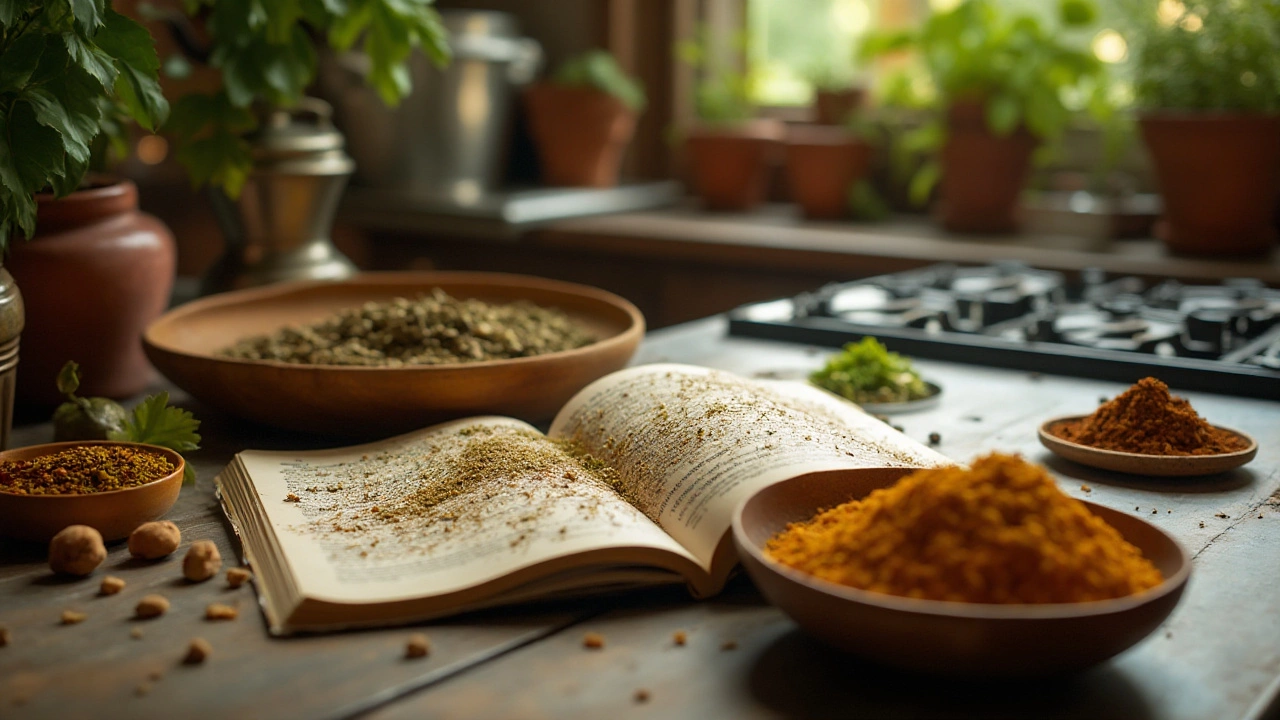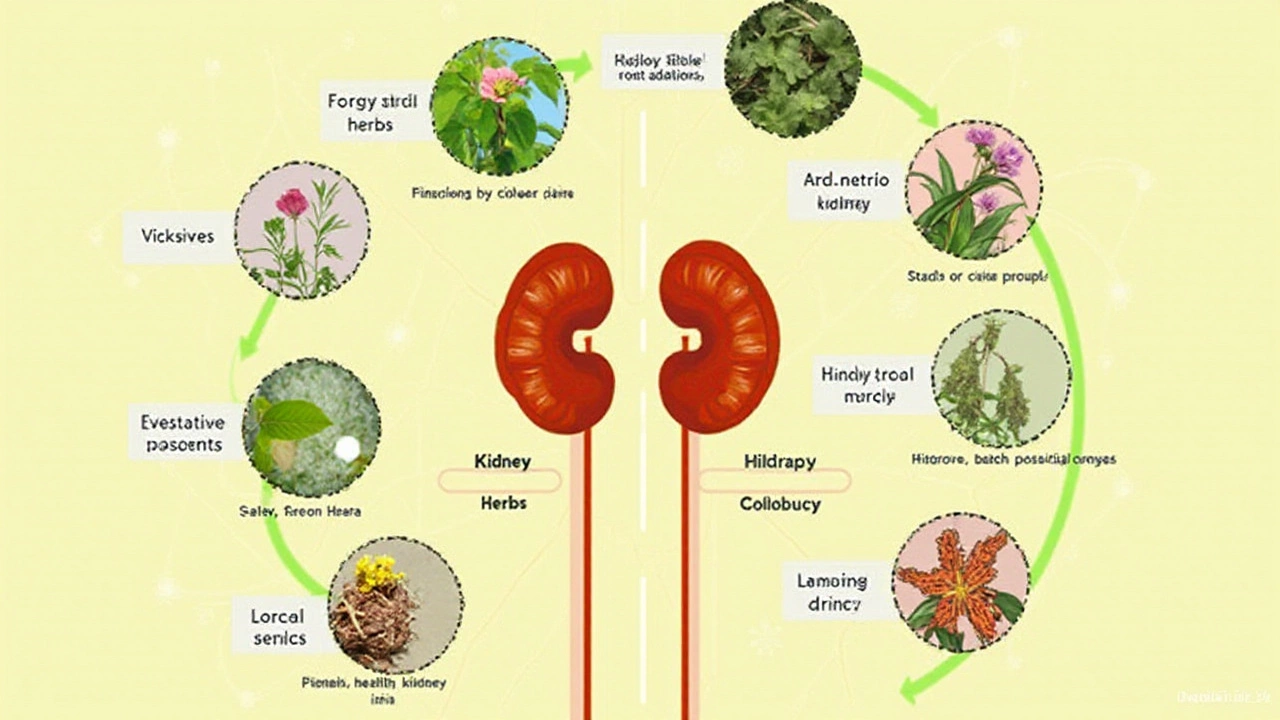Herbs have long been cherished for their healing powers, with countless cultures across the globe tapping into their natural remedies. Yet, while many herbs can boost well-being, some may pose serious risks to your kidneys if not used with care. Kidneys, crucial in filtering waste and balancing fluids, can be sensitive to certain compounds found in various herbal supplements.
With the rising popularity of these supplements, it's crucial to be aware of which herbs could potentially harm kidney health. This article dives into the specifics of how some commonly used herbs might affect your kidneys, why their effects matter, and what measures can be taken to ensure you're not unwittingly putting your kidney health in jeopardy.
- Understanding Kidney Health
- Common Herbs with Risks
- Potential Effects on Kidney Function
- Safe Usage of Herbal Supplements
- Consultation and Precautionary Measures
Understanding Kidney Health
The kidneys are a pair of bean-shaped organs located on either side of your spine, just below the rib cage. They are remarkable multitaskers, essential for maintaining a range of bodily functions. The chief role of the kidneys is to filter waste products and excess fluids from the blood, which are then excreted as urine. This is not merely a background process; it is vital for sustaining life. Your kidneys filter about 200 quarts of blood every day, producing between one and two quarts of urine. This carefully regulated function ensures the body maintains an equilibrium of electrolytes, keeps blood pressure under control, and stimulates the production of red blood cells through a hormone called erythropoietin. The importance of the kidneys in regulating homeostasis cannot be overstated.
Renal health is often taken for granted until something goes wrong. High blood pressure, diabetes, and other chronic conditions can influence kidney performance adversely. When these organs begin to falter, toxins and excess fluids can accumulate, leading to a state of imbalance known informally as kidney failure. Chronic kidney disease (CKD) is a condition characterized by a gradual loss of kidney function over time. According to the World Health Organization, approximately 10% of the global population is affected by CKD, making it a significant public health concern.
"Your kidneys are a critical filter system that prevents the accumulation of waste, and keeping them in good shape is a cornerstone of health maintenance," notes Dr. Susan Wong, a nephrology expert.
Kidney health is deeply interconnected with diet, lifestyle, and overall wellness. Hydration stands as one of the simplest yet most effective ways to support kidney function, as water is essential for the kidneys’ filtering process. Excessive intake of processed foods high in sodium, alongside a sedentary lifestyle, can stress the kidneys—conditions that herbal supplements can exacerbate or mitigate, depending on their nature. Awareness about safe and effective herbal supplementation can serve as a proactive measure for those looking to safeguard their kidney health.
Maintaining optimal kidney function requires a conscious effort to lead a well-balanced lifestyle. Regular physical activity, controlled blood pressure, monitoring blood glucose levels, and a nutrient-rich diet all play a role in supporting the kidneys. One must also be aware that certain medications, both prescription and over-the-counter, can negatively impact renal health. This is where consultations with healthcare professionals become invaluable to ensure both conventional and natural remedies coexist harmoniously without compromising kidney function.
Common Herbs with Risks
The world of herbal supplements is vast and alluring, promising everything from better sleep to increased energy. However, some of these seemingly magical plants harbor risks, particularly when it comes to kidney health. Understanding these risks is crucial for anyone taking a comprehensive approach to their kidney health. Take, for instance, the herb Aristolochia. A traditional medicinal plant used in various cultures, it has been linked to kidney failure and even cancer. The risk factor for Aristolochia is its toxic compound, aristolochic acid, which can wreak havoc on the kidneys, leading to a condition known as aristolochic acid nephropathy. Such effects have led to its ban in many countries, yet the internet still offers access to this hazardous herb in certain supplements.
Another herb to be cautious of is licorice root. Often found in teas and natural remedies, licorice contains glycyrrhizin, which can cause elevated blood pressure and potentially deplete potassium levels. Both outcomes can place strain on the kidneys, negatively impacting their function. Those with pre-existing kidney issues or high blood pressure may find these effects particularly exacerbating. While licorice's flavor can be tempting, especially in cold-weather teas, moderation and awareness are key. It’s these subtleties—ever-present in herbal supplements—that make it necessary for consumers to be well-informed.
One may also consider St. John's Wort, commonly touted for its mood-enhancing properties. While effective for some, this herb can alter the metabolism of medications processed by the kidneys, reducing their efficacy or leading to toxicity. This is particularly relevant for individuals on medications that rely heavily on kidney filtration. Herb-drug interactions are often underestimated, yet they can have profound implications on health, especially when it comes to maintaining strong kidney function. A study published in the "Journal of Herbal Medicine" highlights these interactions, emphasizing the need for thorough consultation before combining herbs with conventional treatments.
"Patients often overlook the potential risks of self-medication with herbs," states Dr. Emily Rogers, a renowned nephrologist. "Understanding these interactions is vital for preserving medication efficacy and kidney health."
In some cases, herbs such as nettle can present hidden hazards. Although nettle has been used for centuries in traditional practices to treat a range of ailments, it contains oxalates, which can contribute to the formation of kidney stones. Those prone to stone formation might find this particularly problematic. Surprisingly, many individuals remain unaware of these risks, emphasizing the need for education on herbal supplements and their impact on the kidneys. Aligning oneself with trustworthy sources for supplement information can mitigate such risks significantly. A proactive approach, coupled with continuous learning, serves as a safeguard against the inadvertent stress these herbal remedies can impose on the kidneys.
Finally, ginseng is worth mentioning as a herb that needs careful consideration. While celebrated for its revitalizing and adaptogenic properties, ginseng can sometimes lead to undesirable outcomes for the kidneys, especially in higher doses. Because it acts primarily to promote blood flow, it could potentially exacerbate any pre-existing conditions related to hypertension, a condition not uncommon in individuals with chronic kidney disease. Caution is especially advised for those engaging in herbal supplements as a part of daily health routines. Being informed about dosage and potential interactions with medical conditions or medications is not just a precaution; it’s an essential practice for safeguarding one's kidney health in the herbal supplement ecosystem.

Potential Effects on Kidney Function
When it comes to monitoring our health, the kidneys play an exceptional role. They do not just filter out toxins and waste from our bloodstream but also help regulate blood pressure, balance fluids, and oversee the production of red blood cells. However, the allure of herbal supplements can sometimes mask their dark side, particularly for those herbs considered harmful to kidney health. Understanding how different herbs affect kidney function can guide us in making informed choices.
Some herbal remedies, despite their natural origins, contain compounds that can be harsh on the kidneys. For instance, Aristolochia, an herb found in some traditional Chinese medicines, has been associated with kidney damage and even cancer. Herbs containing aristolochic acid have been scrutinized for causing what is known as aristolochic acid nephropathy, a condition marked by rapid kidney function decline. Likewise, overuse of herbs like licorice can lead to an increase in blood pressure and cause the kidneys to work overtime, potentially leading to a state of hypertension that exacerbates kidney distress.
St. John's Wort, known for its mood-enhancing properties, can interact with prescription medications, including those used for kidney treatments, thereby altering their intended effects. Similarly, the use of certain herbs like ginseng in large amounts might lead to alarming spikes in blood pressure and subsequent kidney strain. It's advisable to approach such herbs with caution, especially if combining them with other treatments. This speaks to the broader issue of herb-drug interactions, where the very elements that make herbs beneficial can also complicate conventional treatment plans.
According to the National Institute of Environmental Health Sciences, "Natural doesn't always mean safe, and herbs can have very real side effects." This statement rings especially true for individuals already battling kidney issues, as ingesting potentially nephrotoxic herbs may lead to unintended complications.
The role of toxicology in herbal medicine cannot be understated. Some effects might not be immediately visible but present a cumulative risk. For those using herbal supplements, understanding the origins and compositions of these herbs is crucial. Research suggests it is vital to carefully source and dose these supplements to mitigate risks associated with toxicity.
For individuals with pre-existing conditions, like chronic kidney disease, it's imperative to be vigilant about herb intake. A personalized approach to health, one that involves consulting healthcare professionals before integrating herbal supplements, could help safeguard against adverse effects. By doing so, one not only protects kidney function but also enhances overall health resilience. Taking these proactive steps ensures the kidneys remain robust and function optimally, supporting the body's complex systems.
Safe Usage of Herbal Supplements
When it comes to integrating herbal supplements into your daily routine, exercising caution is essential, especially if you aim to protect your kidneys. With a variety of herbs available in the market, each offering a plethora of benefits, it's easy to overlook the potential risks they might impose on kidney health. Being informed about which supplements can adversely affect kidney function is the first step towards safeguarding your health. Reading labels carefully and understanding the properties of each herb can prevent unintended consequences. It's equally important to consider the concentration and dosage, as even beneficial herbs can become toxic when consumed in large quantities. Consulting with a healthcare professional before starting any new supplement is a prudent measure, particularly if you have a pre-existing kidney condition or are on medication that could interact negatively with the herbs.
Many people turn to herbal remedies due to their natural origins, often under the assumption that they are entirely safe. However, without standardized regulation, the actual content and purity of these supplements can vary significantly, making it crucial to purchase only from reputable sources. Choosing products that have been certified by third-party organizations can provide an added layer of assurance regarding their safety and efficacy. Quality aside, it's also vital to adopt a holistic approach by incorporating lifestyle changes alongside herbal supplementation. These may include maintaining a balanced diet, staying hydrated, and avoiding excessive consumption of substances known to strain the kidneys.
"Acknowledging the potential risks of herbal supplements is just as important as recognizing their benefits," notes Dr. Lisa Perino, a well-regarded nephrologist, "Educating oneself about proper usage can prevent unnecessary health complications."It's wise to keep abreast of ongoing research as well. As scientific studies continue to shed light on the interactions between various herbal supplements and kidney care, staying informed can help you make better decisions for your health.
To aid in the decision-making process, developing a personal checklist for supplement intake may be beneficial. This could involve keeping a journal of what you consume, monitoring for adverse reactions, and consistently revisiting your overall health strategy with your healthcare provider. Awareness is a powerful ally when it comes to maintaining optimal kidney health, and an informed approach to using herbal supplements can contribute significantly to this goal.

Consultation and Precautionary Measures
When it comes to integrating herbal supplements into your wellness routine, consulting a healthcare professional is a critical first step. Medical professionals can provide guidance based on your personal health history, particularly if you have pre-existing conditions that could be exacerbated by certain herbs. With the potential for harmful herbs to affect your kidney health, this personalized advice can serve as a safeguard against unintended consequences.
Understanding the interaction between herbs and prescribed medications is essential, as some combinations might lead to adverse effects or compromise the efficacy of important treatments. A kidney specialist or a similar healthcare provider can offer invaluable insights. They can conduct necessary tests to evaluate how your kidneys are functioning and teach you how to monitor and recognize any signs of distress. Importively, being proactive in seeking professional advice can save you from long-term health risks.
The Importance of Dosage and Quality
Not all supplements are created equal, and recognizing the importance of product quality is crucial. Opt for high-quality products from reputable sources, as these are more likely to have been tested for purity and safety. Mislabeling is a common issue, which can lead to ingestion of unwanted or harmful substances. Sticking to recommended dosages is also key in minimizing health risks, as more extensive consumption doesn’t necessarily translate to more benefits. Overuse of even seemingly benign plants can lead to unwanted effects due to bioaccumulation and interactions within the body system. Taking appropriate steps to regulate dosages can significantly mitigate the risks associated with harmful herbs.
A strategic precautionary measure involves educating oneself on the specific herbs that are well-known to pose risks to the kidneys. For instance, herbs such as Aristolochia and Comfrey, which contain compounds linked to kidney toxicity, should be avoided. It is equally important to stay informed about the most recent research findings, as ongoing studies frequently shed light on the complex nature of herbal remedies. This knowledge can empower users to make informed choices about their health regimens.
Dr. Jon Tilburt, a leading expert in integrative medicine, advises: “Herbs have incredible potential, but they are not a substitute for informed medical care. Monitoring one's health should be an ongoing priority.”
Another often overlooked aspect of precaution involves communication. Be transparent with your healthcare provider about all supplements and medications you’re taking. This ensures that they have a complete picture of your health, crucial for avoiding contraindications and assessing overall risks. Such open communication helps forge a partnership in managing kidney health effectively.
The wise approach to using herbal supplements in support of kidney care calls for a holistic view, one that integrates medical consultation, vigilance on quality and dosage, and ongoing education. With these strategies, one can safely appreciate the benefits of herbal remedies while minimizing potential harm to the kidneys.



